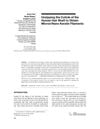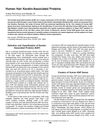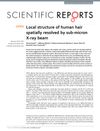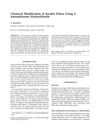4 citations,
January 2020 in “Genes” The KRTAP21-2 gene affects wool length and quality in sheep.
25 citations,
September 2014 in “SpringerPlus” Sheep have a unique gene, KAP8-2, that humans don't have, which may affect wool properties.
1 citations,
September 2023 in “Animals” A new goat gene affects cashmere fiber thickness; certain variations can make the fibers coarser.
 3 citations,
June 2017 in “Journal of Biomaterials Applications”
3 citations,
June 2017 in “Journal of Biomaterials Applications” Keratin extract from human hair was found to promote hair growth in mice.
 9 citations,
January 2015 in “Current problems in dermatology”
9 citations,
January 2015 in “Current problems in dermatology” Scientists have found specific genes linked to different hair loss conditions, which could lead to new treatments.
 9 citations,
January 2017 in “Annals of Dermatology”
9 citations,
January 2017 in “Annals of Dermatology” The study found genetic differences related to hair development that may explain hair loss in a patient with Trichorhinophalangeal syndrome type I.
 7 citations,
August 2006 in “Biopolymers”
7 citations,
August 2006 in “Biopolymers” Researchers extracted tiny keratin filaments from human hair by unzipping its outer layer.
 71 citations,
August 2005 in “The journal of investigative dermatology. Symposium proceedings/The Journal of investigative dermatology symposium proceedings”
71 citations,
August 2005 in “The journal of investigative dermatology. Symposium proceedings/The Journal of investigative dermatology symposium proceedings” Hair keratin-associated proteins are essential for strong hair, with over 80 genes showing specific patterns and variations among people.
 12 citations,
January 2014 in “Cell structure and function”
12 citations,
January 2014 in “Cell structure and function” Different combinations of human hair keratins affect how hair fibers form.
 January 1997 in “Elsevier eBooks”
January 1997 in “Elsevier eBooks” Hair and nails are skin parts that develop early and serve protective and functional roles.
 6 citations,
August 2023 in “BMC genomics”
6 citations,
August 2023 in “BMC genomics” The study found that genetic differences related to hair growth and other traits help cashmere goats adapt to high-altitude environments.
 42 citations,
January 2017 in “Genes”
42 citations,
January 2017 in “Genes” The gene KAP22-1 affects wool yield and fiber shape in sheep.
 1 citations,
January 2024 in “Scientific reports (Nature Publishing Group)”
1 citations,
January 2024 in “Scientific reports (Nature Publishing Group)” Human hair was used to make biodegradable plastic films that could be useful for packaging and disposable products.
 10 citations,
February 2013 in “British Journal of Dermatology”
10 citations,
February 2013 in “British Journal of Dermatology” Thyrotropin-releasing hormone may help control skin and hair growth and could aid in treating related disorders.
7 citations,
July 2019 in “Animals” The KRTAP21-1 gene affects wool yield and can help improve wool production.
 November 2023 in “BMC genomics”
November 2023 in “BMC genomics” The study concluded that the arachidonic acid pathway and the protein KRT79 play a role in determining the fineness of cashmere.
 2 citations,
May 2023 in “Cancer medicine”
2 citations,
May 2023 in “Cancer medicine” KRT80 may worsen cancer by increasing growth and spread, but its full effects on treatment and outcomes need more research.
27 citations,
April 2018 in “Artificial Cells Nanomedicine and Biotechnology” Recombinant human hair keratin proteins can effectively stop bleeding.
12 citations,
September 2013 in “BMC Biophysics” Keratin filaments' elasticity is influenced by their terminal domains and surrounding medium.
51 citations,
September 2012 in “Biomacromolecules” Disulfide bonds make keratin in hair stronger and tougher.
 3 citations,
February 2011 in “Journal of Biomedical Research/Journal of biomedical research”
3 citations,
February 2011 in “Journal of Biomedical Research/Journal of biomedical research” A new mutation in the KRT86 gene was found to cause the hair disorder monilethrix in a Han family.
 17 citations,
July 2018 in “International Journal of Cosmetic Science”
17 citations,
July 2018 in “International Journal of Cosmetic Science” Keratin-based particles safely improve hair strength, smoothness, and heat protection.
10 citations,
November 2021 in “International journal of molecular sciences” Sheep and goat hair fibers are complex due to keratin-associated proteins, which are important for fiber properties and growth.
1 citations,
July 2021 in “IntechOpen eBooks” Environmental factors can cause mutations in skin proteins, leading to skin disorders.
2 citations,
February 2021 in “Journal of comparative pathology” Sheep with chronic Sarcoptes scabiei dermatitis have altered keratin expression in their skin.
 11 citations,
February 2018 in “Amino acids”
11 citations,
February 2018 in “Amino acids” Copper and iron cause keratin damage in hair by converting methionine to homocysteine.
16 citations,
January 2018 in “Advances in experimental medicine and biology” Hair and wool have diverse keratins and keratin-associated proteins.
 24 citations,
November 2015 in “Scientific reports”
24 citations,
November 2015 in “Scientific reports” Human hair has a new region with ordered filaments and the cuticle contains β-keratin sheets.
 16 citations,
October 2003 in “Journal of applied polymer science”
16 citations,
October 2003 in “Journal of applied polymer science” 2-iminothiorane hydrochloride improves hair waving permanence without damage.
8 citations,
January 2011 in “International journal of trichology” Accurate diagnosis of APL is crucial to avoid unnecessary treatments.

















